2014 Accomplishment Report of the
Philippine Permanent Mission to ASEAN in Jakarta
Executive Summary
The Philippine Permanent Mission to ASEAN in Jakarta(Jakarta PM) attended a total of 239 meetings in 2014where it championed the advocacies of the Philippines and contributed to the growth of ASEAN, in line with its mandate to further Philippine interests through the work of the Committee of Permanent Representatives (CPR) to ASEAN, the ASEAN Connectivity Coordinating Committee (ACCC), the Initiative for ASEAN Integration (IAI) Task Force, the Board of Trustees of the ASEAN Foundation (AF), and the Governing Council of the ASEAN Institute for Peace and Reconciliation (AIPR). H.E. Elizabeth P. Buensuceso, the Philippine Permanent Representative to ASEAN, and other Mission officials moreover took part in76 additional functions and activities with other ASEAN Member States, Dialogue Partners, and/or other External Parties.
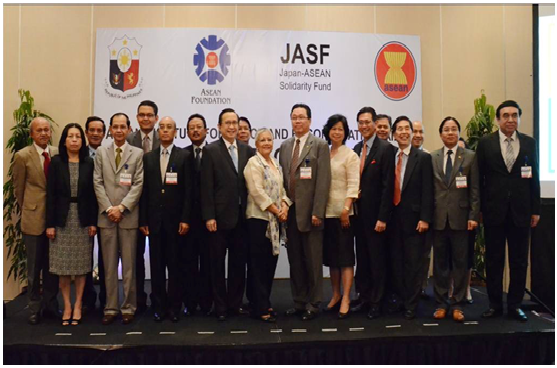
Presidential Adviser on the Peace Process Teresita Quinots-Deles with Foreign Affairs Undersecretary Evan P. Garcia, Permanent Representative of the Philippines to ASEAN Ambassador Elizabeth P. Buensuceso, and members of the AIPR Governing Council and Advisory Board.
In relation, Jakarta PM submitted a total of 226 policy advice and recommendations related to ASEAN to the Philippine Department of Foreign Affairs last year, particularly on ASEAN’s External Relations and key advocacies for the Philippines. The latter include the rule of law, good governance, the peaceful settlement of disputes in the West Philippine Sea/South China Sea, human rights and the rights of women and children, climate change, biodiversity conservation, and inclusive and sustainable development. The Philippines also currently serves as the Country Coordinator for ASEAN-Australia relations.
The Mission also spearheaded the organization of six activities during the year:
- The 8th Joint Planning and Review Committee (JPRC) Meeting of the ASEAN-Australia Development Cooperation Program (AADCP) Phase IIon19 March 2014 in Jakarta, Indonesia, where Australia reaffirmed its commitment to support ASEAN integration and noted its intention to hire a Program Design Consultant to help Sectoral Bodies and the ASEAN Secretariat develop project concepts under AADCP II’s various workstreams;
- The AIPR Symposium on Peace and Reconciliation Processes and Initiatives on 7-8 April 2015 in Manila, Philippines, which gave the members of the AIPR Governing Council and the AIPR Advisory Board the opportunity to listen to the ideas and experiences of experts in peace and mediation initiatives;
- The CPR Visit to Australia on 27 May to 1 June 2014 in Melbourne, Canberra, and Sydney, Australia, which allowed the CPR to exchange views with Australian officials, think tanks, and other stakeholders on issues of mutual interest;
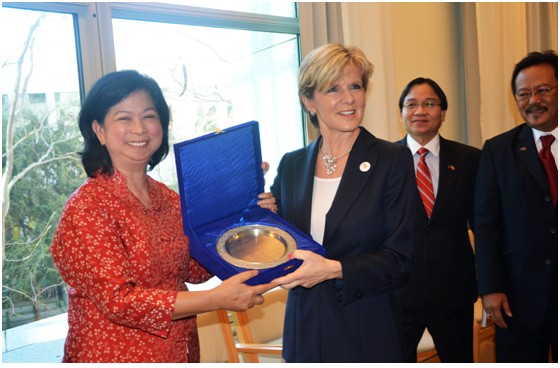
Ambassador Elizabeth P. Buensuceso presents Foreign Minister Julie Bishop with a plaque of appreciation during the CPR’s call at the Parliament House in Canberra.
- The Pre-Conference for the ASEAN High-Level Conference on Assistance for the Recovery of Yolanda-Affected Areas (ARYA) on 15 July 2014 in Jakarta, Indonesia, whichintroduced the project entitled “ASEAN’s Strategic Assistance for the Recovery of Haiyan-Affected Areas in the Philippines” and provided an opportunity for stakeholders to identify possible forms of assistance for said communities;
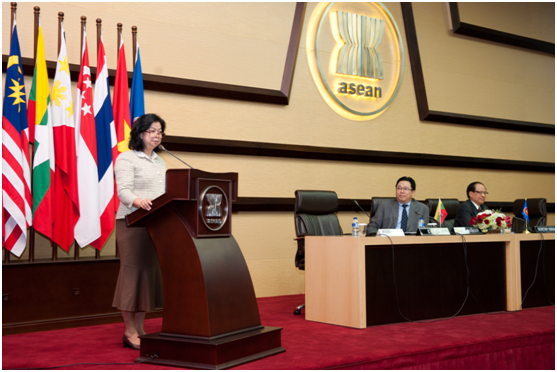
Ambassador Elizabeth P. Buensuceso speaking about the Philippines’ reconstruction and recovery strategy in Haiyan-affected areas and the relevance of the ARYA Conference to be held in Manila on 14 August 2014.Looking on are ASEAN Secretary General H.E. Le Luong Minh and CPR Chair H.E. Min Lwin of Myanmar.
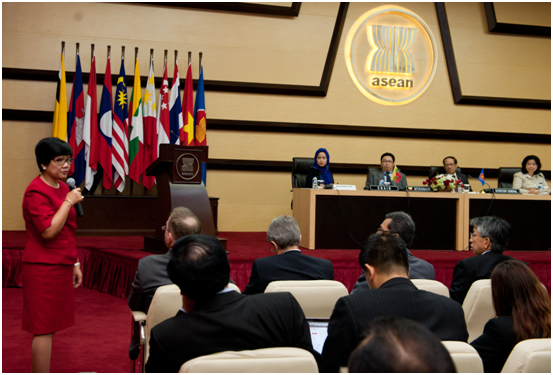
ASEAN Deputy Secretary-General for Socio-Cultural Affairs Alicia Bala-dela Rosa discussing the various aspects of the ASEAN Strategic Assistance for the Recovery of Haiyan Affected Areas in the Philippines project.
- The 4th ASEAN-Australia Joint Cooperation Committee (JCC) Meeting on 25 September 2015 in Jakarta, Indonesia, which reaffirmed ASEAN’s and Australia’s shared commitment to further strengthen their comprehensive partnership, and considered the ASEAN-Australia Commemorative Summit to be held on 12 November 2014 in Nay Pyi Taw, Myanmar to mark the 40th anniversary of ASEAN-Australia Dialogue Relations as an opportunity to elevate the mature ties to a higher level and;
- The ASEAN PPP Networking Forum on 16-17 December 2014 in Manila, Philippines, which gave the ACCC, PPP and relevant senior officials, Dialogue Partners, development institutions, international organizations and the private sector the opportunity to share their experience and best practices in relation to PPP, discuss principles and frameworks as well as project development techniques, and explore PPP as a resource mobilization strategy to implement the Master Plan on ASEAN Connectivity (MPAC). The ACCC moreover discussed the possibility of forming an expert group to share experiences, best practices, and lessons in conducting PPPs in the region, particularly to assist in the development of PPP units in some ASEAN Member States, as well as to nurture the PPP framework in ASEAN Member States that are in their infancy stage.
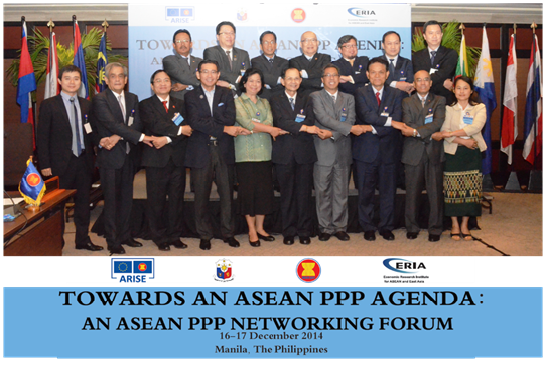
ASEAN Connectivity Coordinating Committee (ACCC) Representatives pose for a photo in between sessions of the ASEAN PPP Networking Forum.
Finally, Mission monitored and facilitated the Philippines’ endorsement of 102 ASEAN projects in 2014, as the latter were subjected to the ASEAN Secretariat’s project appraisal and approval process. Of the said projects, nine were initiated by the Philippines. Another twelve Philippine-led project proposals remained in the preparation stage by the end of 2014, and are expected to go through the same project appraisal and approval exercise in 2015.
The Philippine Permanent Mission to ASEAN was established in Jakarta in 2009 in accordance with ASEAN Member States’ commitment to appoint a Permanent Representative to ASEAN with the rank of Ambassador, as enshrined in the ASEAN Charter. As the depth and breadth of ASEAN’s work has expanded, however, the roles and responsibilities of both the Permanent Representative and the Mission have grown as well.

